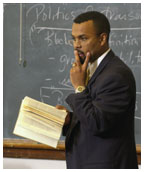Eddie S. Glaude Jr. *97 (photo by Frank Wojciechowski) |
December 8, 2004: From the Editor
Jonathan Jew-Lim ’04 didn’t come to Princeton expecting to be a teacher. Like many of his classmates, he had plans for a career in business or law. He still can’t put his finger on exactly what it was that changed his mind, except to say that “helping people, especially young people, is something that I enjoy doing and ... consider one of the most important tasks in society.”
So while other classmates are embarking on high-profile, highly paid careers, Jonathan is one of 29 members of the Class of 2004 who are teaching or student-teaching in primary or secondary schools this year. The teachers are earning an average salary of $35,687 per year, oftentimes to work in underfunded, overloaded classrooms in schools and communities that have little hope.
Last month, Princeton held an event to honor them, and to let them know that they are part of a community of educators that has great meaning to the University. “We believe there is no better way to serve the nation, and no better way to use a Princeton degree, than to teach,” said Todd Kent, associate director of Princeton’s Program in Teacher Preparation, at the program’s convocation. The program allows students to pursue requirements beyond those normally required for a Princeton degree, including student-teaching, to earn New Jersey teaching certificates.
The highlight of the convocation was the keynote address by Eddie S. Glaude Jr. *97, associate professor of religion, whose talk was titled “On Democracy and Education.” Like the education reformer John Dewey, Glaude spoke about cultivating a “democratic disposition” in the nation’s children — something that Glaude feels is sorely missing from schools, and beyond that, from the nation, today. “Ours is a nation so full of hubris,” he said. “We believe that our way is the right way. That achievement is a mark only of our individual merit. That structures of inequality that obstruct the dreams of others matter little. Individuals fail because of some inherent personality flaw. ... We have become a mean-spirited nation, free to hate those who are not like us.” He spoke about the schools themselves: “When we listen to current debates about our schools we hear voices not concerned with cultivating democratic dispositions. Instead we hear the bitter language of defensiveness.” We reprint the talk, which brought the audience to its feet, available online (click here for excerpt).
As a student-teacher at Ewing High School near Trenton, Jonathan Jew-Lim has been struck by his school’s orderliness and control – orderliness maintained by a system of security cameras and hall passes, much different from the secondary school he attended himself. He has learned to appreciate the significance of cultural identity. “If you don’t understand how both your culture and your students’ cultures play out in the classroom, it’s impossible to be an effective teacher because you end up talking past one another,” he said.
Glaude ended his talk with a challenge to “educate [our children]
into the habits of democracy.” Jew-Lim and his Princeton teacher-classmates
have staked their own places in this effort.![]()
![]()
Marilyn H. Marks *86
mmarks@princeton.edu


